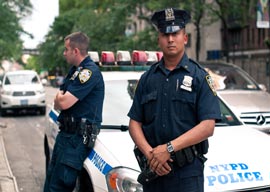
July 22, 2015

Source: Shutterstock
A major hiring issue that seems to differ from city to city is whether the written exam is the basis for rank-ordering hires, as New York successfully did in 1939, or is treated merely as pass-fail with high passing rates. Cities that say they hire in rank order of test scores include New York, Los Angeles, Seattle, and Las Vegas. In contrast, cities that claim to use a random lottery to hire from among anybody who passes the test include Philadelphia, Baltimore, Chicago, San Francisco, San Diego, and Portland.
For example, Chicago hires randomly from the lists of everybody who passed the extremely easy police-and-fire-applicants written tests. Last December, 17,948 passed Chicago’s fire test and only 2,583 failed. Police hiring in Chicago is similar, which means that thousands of the most promising candidates are skipped over, with only the bottom of the barrel scraped off. How are passing scores determined in the months it takes Chicago to grade its Scantron tests? Nobody seems to know, but an anonymous commenter on Second City Cop hypothesized, “Passing score will be one point below the stupidest guy with clout.”
In 2010, Chicago floated the idea of becoming the only big city in the country to do away with its police test because it had become so pointless.
Why do cities engage in such an obviously dysfunctional undertaking as random hiring of police?
No doubt because random hiring helps facilitate nepotism and corruption; but the public justification is, of course, race.
Sometimes lowering standards is used as a way to get around having to use a racial quota; other times it’s used to cover up quotas. Philadelphia, for instance, shifted in 1989 from rank-ordering test takers to a lottery among the 85 percent who passed the written exam because:
Ronald L. Oliver, president of the Guardian Civic League, which represents black police officers, said the change to pass-fail also would erase an unfair stigma sometimes attached to those minority candidates who, because of the consent decrees, were chosen ahead of white applicants who scored higher.
The inevitable problem with random selection is that cities don”t get the best of each race. Chicago and Philadelphia are letting whites in the bottom 10 percent of the white intelligence distribution get hired. They are not likely to be good decision-makers.
The superior solution would be to hire cops in rank order within their race’s quota. That way, police departments would get the best blacks and best whites rather than the random flotsam chosen by lottery.
But it should also be admitted that police jobs, being intensely political, are different from most other jobs; so affirmative action could be limited to just those few careers where it is in the public interest.
If any Supreme Court clerks are reading this while working on Fisher v. U. of Texas, feel free to borrow this reasoning.